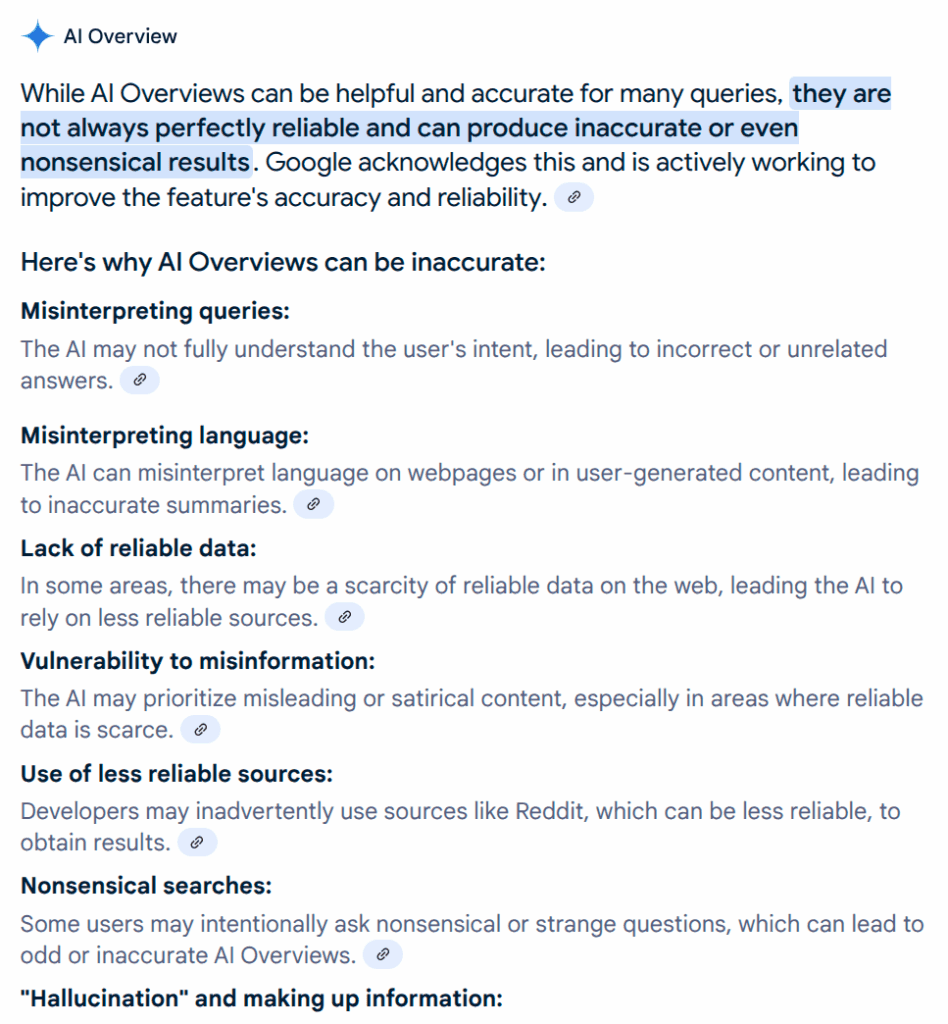Google’s launch of AI Overviews is arguably the most transformative shift in the search landscape since featured snippets were introduced, but let’s take a closer look at this new development from Google and what key takeaways you need to know.
What are AI Overviews and why should you care?
AI Overviews are AI-generated summaries that appear directly within Google Search results, designed to instantly display relevant content from across the web using Google’s generative AI models. Unlike featured snippets, which typically extract a sentence or two from a single source, AI Overviews aim to consolidate knowledge from multiple sources to provide users with a more in-depth and direct answer, effectively turning Google into both a search engine and an answer engine. But why should you care? This matters because these summaries appear above organic results, meaning that there will be a reduction in clicks to websites since Google has removed the need for users to engage with onsite content.
Key statistics and takeaways
Because AI Overviews are still relatively new, new research is constantly being done. These are the most relevant stats as of April 2025:
- AI Overviews are on the rise: 13.14% of all queries triggered AI Overviews in March 2025. That’s up from 6.49% in January 2025. (Source: Semrush)
- Informational content is most likely to trigger AI Overviews: 88.1% of queries that trigger an AI Overview are informational. (Source: Semrush)
- Around 12% of AI Overviews follow a ordered list format (Source: SurferSEO)
- The number of navigational queries that trigger AI Overviews has doubled since January, from 0.74% to 1.43%. (Source: Semrush)
- In the AI Overview crosshairs—Science, Health, and Society: Science (+22.27%), Health (+20.33%), People & Society (+18.83%), and Law & Government (+15.18%) are the industries experiencing the largest share growth of AI Overviews—indicating a rapid shift in how users get answers in these high-trust, information-dense categories. (Source: Semrush)
- Its reported that around 88% of users click “show more” to expand many of the truncated AI overviews even if they don’t absorb all the information on display. (Source: WordStream)
- Around 99% of all answers provided by an AI overview fall under 328 words. (Source: SurferSEO)
- 7x increase queries of 8+ words. (Source: Search Engine Land)
- 48% rise in technical terminology in search queries. (Source: Search Engine Land)
- 400% increase in citations from results in positions 21–30. (Source: Search Engine Land)
- The top 50 domains on Google get nearly 30% of all AIO mentions. (Source: WordStream)
- 200% increase in citations from results positions 31-100. (Source: Search Engine Land)
- 89% of citations come from beyond the top 100 organic listings. (Source: Search Engine Land)
- AI Overviews mention an average of 5 sources per query (Source: SurferSEO)
- 71% of the time, the top 10 domains rank for more keywords than those that are used as sources within the AI overviews. (Source: SurferSEO)
- AI Overviews are now available in over 200 countries and territories, and more than 40 languages. (Source: Google)
- Around 70% of consumers say that they somewhat trust the information provided by generative AI search results. (Source: WordStream)
- Around 52% of sources mentioned in AI overviews rank in the top 10 search results. (Source: SurferSEO)
- Tests by Google revealed that the accuracy rate of AI Overviews matches that of featured snippets, which users generally consider to be reliable (Source: Google).
- Semrush found that 82% of desktop and 76% of mobile AI Overviews occurred for keywords with less than 1000 monthly searches (Source: Semrush).
- It has been reported that some websites have seen between a 20-40% decrease in organic traffic since AI overviews have been introduced to the SERP. (Source: WordStream)
- AI Overviews were triggered for 6.49% of queries in January… (Source: Semrush)
- That climbed to 7.64% in February (an 18% increase)…
- And then up to 13.14% by March (72% growth from the previous month)
- AI Overviews contain the exact query within their response around 5.4% of the time. (Source: SurferSEO)
- It’s reported that around 25-34 year olds on mobile devices use AI overviews the most. (Source: WordStream)
- Some typical triggers taken from a recent study show the following top-level keyword metrics (Source: Semrush):
- Average search volume is around 338
- Median search volume is 70
- Average CPC is $0.53
- Max CPC is $26.41
- Average keyword difficulty is around 0.38
- AI Overviews only have a 10% chance of showing for commercial or transactional keywords. (Source: WordStream)
- 5.5% of AI overviews include information from Reddit within their response. (Source: WordStream)
- 61% of AI overviews follow a unordered list format in there response. (Source: SurferSEO)
- About 81% of AIO SERPs also include a “People Also Ask” section. (Source: WordStream)
- It has been shown that AI Overviews appear less for local queries which currently stands at around 7%. (Source: WordStream)
The search intent behind triggering AI overviews
Current data reveals a key insight: AI Overviews are still primarily targeting informational, top-of-the-funnel content rather than conversion-focused queries. However, there’s a subtle but notable shift underway.
Since January, the share of AI Overviews triggered by commercial queries has risen from 6.28% to 8.69%, transactional queries have edged up from 1.69% to 1.76%, and navigational queries have nearly doubled—from 0.74% to 1.43%.
Informational content remains the most vulnerable to AI Overviews, but the gradual increase in commercial, transactional, and especially navigational queries suggests that mid- and bottom-of-the-funnel terms are increasingly at risk. The sharp rise in navigational queries is a particularly strong signal that even branded traffic may soon be impacted.

The accuracy of AI overviews
The accuracy of AI overviews, while they are continually improving, remains a big point of discussion and concern in the SEO community. While these AI-generated summaries aim to gather information from multiple sources and provide quick, digestible answers to users, they are still in the early stages of testing, so mistakes and inaccuracies are still occurring.
Google is still working on new ways to address these issues through updates to its algorithm and revisions to its guidelines, which include stricter rules and standards for content.
How do AI overviews work?
AI Overviews might appear similar to traditional SERP features like featured snippets, as they both aim to provide quick answers directly within the search results and are informed by content from top-ranking websites or content that is deemed as relevant to the user. However, the underlying technology makes AI Overviews fundamentally different.
Unlike featured snippets, which lift exact excerpts from a cited webpage, AI Overviews use generative AI to produce comprehensive summaries designed to fully address the user’s question.
These summaries are created using Google’s Gemini large language model (LLM), which generates text based on the search engine’s broader understanding of the topic. Some responses often span several paragraphs and may require users to click to view the entire answer.
Since LLMs rely on training data that isn’t tied to specific, linkable sources, Google supplements these AI-generated summaries with a list of web pages that most closely align with the content. These cited websites come from a separate data source: Google’s organic search index—the same index that powers traditional search results (commonly referred to as the “ten blue links”).
What is GEO (Generative Engine Optimisation)
GEO stands for “generative engine optimisation”, which is the process of optimising your website’s content to improve your online visibility in AI-driven search engines such as ChatGPT, Gemini, Google AI Overviews and Copilot.
The practice of GEO aims to position your website or brand to appear in these AI-generated results when users search for terms and queries related to specific products, services or information around a type of expertise.
As organic search continues to evolve, GEO will become a far more common practice and will be required in order for your business to stay relevant and ahead of competitors. It’s not only about being seen, but showcasing relevant information and content that will encourage potential customers and clients to engage regardless of where they begin in their search journey.
GEO vs. SEO: What’s the difference?
GEO (Generative Engine Optimisation) leverages AI to create search optimised content, whereas traditional SEO depends on manual processes like keyword research and content creation. GEO can quickly analyse vast amounts of data and generate content at scale, while traditional SEO is more labour-intensive and time-consuming.
Although GEO provides significant benefits, it shouldn’t be seen as a full substitute for traditional SEO. Instead, it serves as a powerful complement, improving your broader organic strategy. When used together, GEO and traditional SEO methods can produce stronger, more effective results.
So what’s next for SEO’s…
The rise of AI Overviews marks a significant turning point for SEO, demanding a fundamental shift in how we approach visibility and content strategy. As Google increasingly serves answers directly within the SERP, traditional tactics focused solely on ranking in the top 10 are no longer enough. SEO strategies must now evolve to prioritise content that aligns with how AI Overviews are generated, focusing on topical authority, clarity, and structured data that enhances the chances of being cited.
With informational content most impacted, and commercial and navigational queries steadily entering the fold, brands must diversify their approach. This means creating deeper, more comprehensive resources, optimising for long-tail and complex queries, and positioning content to support AI’s understanding, rather than just a search engine’s index.
In this new era of AI-assisted search, success will belong to those who adapt early, experiment often, and embrace the evolving nature of SEO as part of a broader content and visibility strategy.












